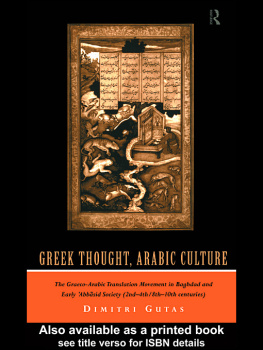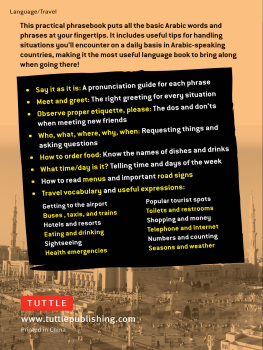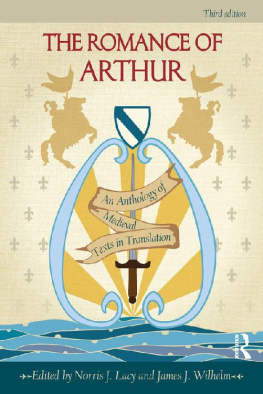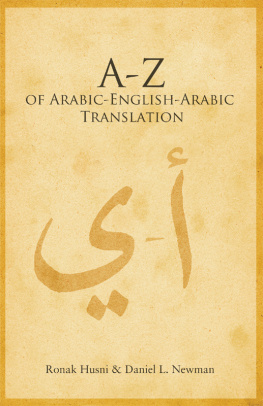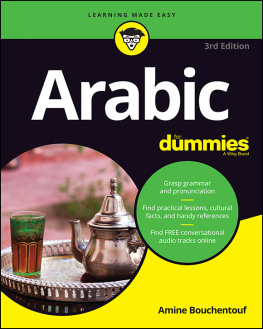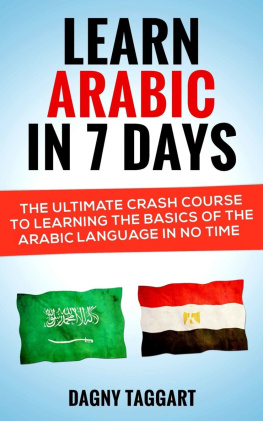Trbners Oriental Series
ARABIC THOUGHT AND ITS PLACE IN HISTORY
Trbners Oriental Series
ARABIC HISTORY AND CULTURE
In 6 Volumes
I | Arabian Medicine and its Influence on the Middle Ages Vol I
Donald Campbell |
II | Arabian Medicine and its Influence on the Middle Ages Vol II
Donald Campbell |
III | Studies: Indian and Islamic
S Khuda Bukhsh |
IV | A Short History of the Fatimid Khalifate
De Lacy OLeary |
V | Arabia Before Muhammad
De Lacy OLeary |
VI | Arabic Thought and its Place in History
De Lacy OLeary |
ARABIC THOUGHT AND ITS PLACE IN HISTORY
DE LACY OLEARY
First published in 1922 by
Routledge, Trench, Trbner & Co Ltd
Reprinted in 2000, 2001, 2002 by
Routledge
2 Park Square, Milton Park, Abingdon, Oxon, OX14 4RN
Transferred to Digital Printing 2007
Routledge is an imprint of the Taylor & Francis Group
1922 De Lacy OLeary
All rights reserved. No part of this book may be reprinted or reproduced or utilized in any form or by any electronic, mechanical, or other means, now known or hereafter invented, including photocopying and recording, or in any information storage or retrieval system, without permission in writing from the publishers.
The publishers have made every effort to contact authors/copyright holders of the works reprinted in Trbners Oriental Series.
This has not been possible in every case, however, and we would welcome correspondence from those individuals/companies we have been unable to trace.
These reprints are taken from original copies of each book. In many cases the condition of these originals is not perfect. The publisher has gone to great lengths to ensure the quality of these reprints, but wishes to point out that certain characteristics of the original copies will, of necessity, be apparent in reprints thereof.
British Library Cataloguing in Publication Data
A CIP catalogue record for this book is available from the British Library
Arabic Thought and its Place in History
ISBN 0-415-24467-6
Arabic History and Culture: 6 Volumes
ISBN 0-415-24285-1
Trbners Oriental Series
ISBN 0-415-23188-4
ARABIC THOUGHT AND ITS PLACE IN HISTORY
BY
DE LACY OLEARY, D.D.
Lecturer in Aramaic and Syriac, Bristol University
L ONDON :
ROUTLEDGE, TRENCH, TRUBNER & CO., LTD.
NEW YORK : E. P. DUTTON & CO.
1922
Foreword
History traces the evolution of the social structure in which the community exists to-day. There are three chief factors at work in this evolution; racial descent, culture drift, and transmission of language: the first of these physiological and not necessarily connected with the other two, whilst those two are not always associated with each other. In the evolution of the social structure the factor of first importance is the transmission of culture, which is not a matter of heredity but due to contact, for culture is learned and reproduced by imitation and not inherited. Culture must be taken in the widest sense to include political, social, and legal institutions, the arts and crafts, religion, and the various forms of intellectual life which show their presence in literature, philosophy, and otherwise, all more or less connected, and all having the common characteristic that they cannot be passed on by physical descent but must be learned in after life. But race, culture, and language resemble one another in so far as it is true that all are multiplex and perpetually interwoven, so that in each the lines of transmission seem rather like a tangled skein than an ordered pattern; results proceed from a conflicting group of causes amongst which it is often difficult to apportion the relative influences.
The culture of modern Europe derives from that of the Roman Empire, itself the multiple resultant of many forces, amongst which the intellectual life of Hellenism was most effective, but worked into a coherent system by the wonderful power of organization, which was one of the most salient characteristics of that Empire. The whole cultural life of medival Europe shows this Hellenistic-Roman culture passed on, developed, and modified by circumstances. As the Empire fell to pieces the body of culture became subject to varying conditions in different localities, of which the divergence between the Greek-speaking East and the Latin-speaking West is the most striking example. The introduction of Muslim influence through Spain is the one instance in which we seem to get an alien culture entering into this Roman tradition and exercising a disturbing influence. In fact, this Muslim culture was at bottom essentially a part of the Hellenistic-Roman material, even the theology of Islam being formulated and developed from Hellenistic sources, but Islam had so long lived apart from Christendom and its development had taken place in surroundings so different that it seems a strange and alien thing. Its greatest power lay in the fact that it presented the old material in an entirely fresh form.
It is the effort of the following pages to trace the transmission of Hellenistic thought through the medium of Muslim philosophers and Jewish thinkers who lived in Muslim surroundings, to show how this thought, modified as it passed through a period of development in the Muslim community and itself modifying Islamic ideas, was brought to bear upon the culture of medival Latin Christendom. So greatly had it altered in external form during the centuries of its life apart, that it seemed a new type of intellectual life and became a disturbing factor which diverted Christian philosophy into new lines and tended to disintegrate the traditional theology of the Church, directly leading up to the Renascence which gave the death-blow to medival culture: so little had it altered in real substance that it used the same text-books and treated very much the same problems already current in the earlier scholasticism which had developed independently in Latin Christendom. It will be our effort so to trace the history of medival Muslim thought as to show the elements which it had in common with Christian teaching and to account for the points of divergence.
De L. OL .
Chapter I
The Syriac Version of Hellenism
The subject proposed in the following pages is the history of the cultural transmission by which Greek philosophy and science were passed from Hellenistio surroundings to the Syriac speaking community, thence to the Arabic speaking world of Islam, and so finally to the Latin Schoolmen of Western Europe. That such a transmission did take place is known even to the beginner in medival history, but how it happened, and the influences which promoted it, and the modifications which took place en route, appear to be less generally known, and it does not seem that the details, scattered through works of very diverse types, are easily accessible to the English reader. Many historians seem content to give only a casual reference to its course, sometimes even with strange chronological confusions which show that the sources used are still the medival writers who had very imperfect information about the development of intellectual life amongst the Muslims. Following medival usage we sometimes find the Arabic writers referred to as Arabs or Moors, although in fact there was only one philosopher of any importance who was an Arab by race, and comparatively little is known about his work. These writers belonged to an Arabic speaking community, but very few of them were actually Arabs.






